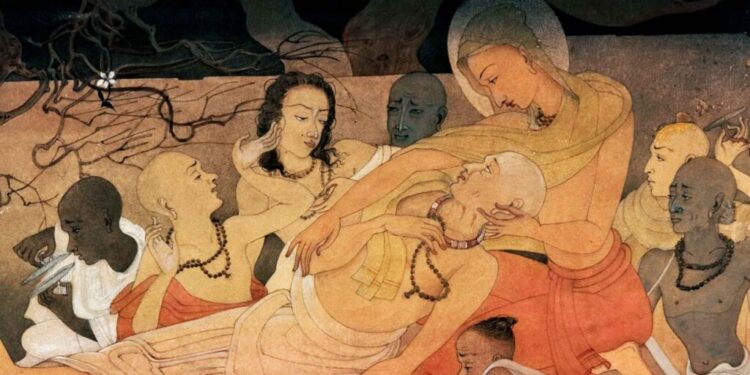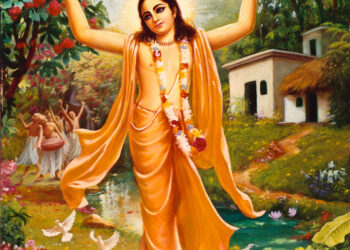Sensual pleasures pale in comparison to the higher taste of devotion to Lord Kṛṣṇa.
By Arcana-siddhī Devī Dāsī
I SIT AT THE lunch table with some of my colleagues as we say goodbye to one of our co-workers. I’m soon reminded of why I tend to stay away from such gatherings: As usual, the conversation eventually turns to the topic of sex.
Mimi, a fifty-eight-year-old woman, talks about her efforts to preserve an active sex life with her partner, Phil. He’s taking the aphrodisiac Viagra, and I casually listen as Mimi raves about their renewed sex life. Viagra, in her estimation, is a miracle.
“Viagra or vairāgya,” I think, recalling my husband’s recent quip.
Vairāgya means to voluntarily renounce something to gain something of greater value. A story from India illustrates the principle well. Five hundred years ago, Sanātana Gosvāmī, a great devotee of the Lord, owned a touchstone. It was said that this stone could convert iron into gold. A poor man, hearing that Sanātana owned such a treasure, went to seek it out. When he approached Sanātana Go-svāmī, he asked about the touchstone. Sanātana told him he could take it from the rubbish heap.
Because the man had some intelligence, he reasoned that if Sanātana had discarded this valuable item, he must have something of greater value. The man then submissively approached Sanātana Gosvāmī and asked what greater thing he possessed.
Sanātana bargained with the man, saying he would give him the greater thing if the man would throw away the touchstone. The man readily complied, and Sanātana Gosvāmī gave him the chanting of the Lord’s holy names: Hare Kṛṣṇa, Hare Kṛṣṇa, Kṛṣṇa Kṛṣṇa, Hare Hare/ Hare Rāma, Hare Rāma, Rāma Rāma, Hare Hare.
The man in the story happily gave up something lower (and material) for something higher (and spiritual). That’s vairāgya. When Śrīla Prabhupāda introduced Kṛṣṇa consciousness in the West, he didn’t start by emphasizing vairāgya; he didn’t insist that we give things up right away. He was so kind that he gave us the holy name and didn’t ask us to give up our touchstones as a prerequisite for chanting. But the vairāgya came on its own. As we practiced chanting the mahā-mantra, our taste for material activities gradually diminished and we were able to give up many unwanted habits. Most devotees easily give up meat, gambling, and intoxication, three of the four main prohibitions. They give up illicit sex, too, but that’s harder, because sexual desire is so deep-rooted. Getting rid of it takes time. That’s one reason most devotees enter family life, choosing to raise God-conscious children rather than stay celibate.
While sex is permitted within marriage, it is to be regulated and eventually given up. Non-devotees and even devotees often question why something so seemingly good and intimate needs to be eliminated from their repertoire of activities. Is Kṛṣṇa being unkind to us to demand such a sacrifice? No, Kṛṣṇa wants us to come to a far greater pleasure, but it can’t be reached as long as we stay attached to bodily pleasures. Our best interest is to work toward giving up sex so we can transcend the limited material sphere of temporary activities.
Help From Nature
Kṛṣṇa has designed our bodies to help us gradually let go of sex desire. As we progress through the biological stages of human development, our sexual ability naturally decreases. Unfortunately, today we live in a sex-crazed society, and a provocative media artificially stimulates us, constantly bombarding us with erotic images. Even while innocently standing in grocery store check-out lines, we’re accosted by magazine covers with pictures of scantily clothed men and women. Two of the many societal consequences are that pre-pubescent children become interested in sex and the elderly are titillated into finding ways to reawaken their waning sexual inclinations.
Most people would agree that childhood promiscuity is unwanted, but those same people would support prolonging sexual activity in their life. They’d like to be able to fulfill sexual desires, which persist even in old age.
Sexual desire is so strong that without spiritual training even a dying person will think of sex. To support this assertion, Prabhupāda tells the story of a king and his minister. When the king asked his minister when the desire for sex would end, the minister replied that it lasts up to death.
The king doubted his minister’s answer. Wanting to prove his point, the minister took the king and the king’s young daughter to visit a man on his deathbed. The man was a loyal subject and would no doubt be thrilled by a visit from the king. But when the king and his daughter entered the room, the dying man’s eyes focused, not on the face of the king, but rather on the attractive young girl.
One may question why sexual desires at death are bad. The Vedic scriptures tell us that our thoughts and desires at death carry us to our next destination. To think of sex at death guarantees our return to the material world. Because our thoughts at death are naturally a composite of the activities and desires of our life, a preoccupation with sex may mean taking a body more suited to enjoying sex, such as that of a monkey or a pigeon. Both species can have sex many times a day with no guilt or inhibitions.
When I first became a devotee, I shared knowledge of the soul’s transmigration from body to body directed by our desires at death with a close friend of mine. Unfortunately, he could not see the harm in becoming a pigeon or a monkey. I felt sorry that he was so attached to sex that he liked the idea of falling into a lower species with no chance for spiritual advancement.
Choosing Vairāgya
Ideally if we have spent our lives cultivating spiritual desires by practicing spiritual activities, we will be transported to our eternal spiritual home. If this is our goal, we’ll choose vairāgya. We’ll voluntarily choose to give up things that impede our progress. And we’ll choose to accept things that help us develop our dormant love for the Lord. For many followers of the bhakti path, renunciation is gradual. As we advance on the path and our realizations and taste for spiritual activities increase, we naturally let go of materialistic activities. In his purport to verse 3.31 of Bhagavad-gītā, Śrīla Prabhu-pāda tells us that even if we can’t at once follow a particular instruction to give up material activity, as long as we don’t resent the principle we’ll gradually progress on the path of perfection.
This isn’t an endorsement of continued materialistic behavior, but rather it serves as encouragement to keep trying without loss of hope. Kṛṣṇa is well aware of how difficult it is for us to progress in conquering sexual desire. That’s why He sent so much help, especially in the form of our spiritual master Śrīla Prabhupāda, who expertly understood our mentalities. While preaching in the West, Prabhupāda simplified the process of bhakti-yoga to accommodate our way of life and our tainted consciousness. He wrote many books making Vedic literature accessible to us and encouraged his dis-ciples to write their realizations as well.
Kṛṣṇa also sent His holy names. Being identical to Him, His names have the power to transform our worldly mentality into transcendental consciousness. The holy names convert our feelings of lust into pure love. They remove the blanket of abject ignorance and illuminate us with knowledge. The names can release us from the shackles of sex life, the binding force in the material world.
Yes, sex is such a seemingly wonderful thing that we’re willing to sacrifice the kingdom of God for it. We’re willing to be cramped up in a mother’s womb again and face the trauma of birth. We’re willing to be helpless babies suffering from hunger, indigestion, and diaper rash. We’re willing to be school-age children again, forced to sit still for long hours of the day, waiting for the bell ring to set us free. We’re willing to suffer through awkward adolescence with acne and braces. We’re willing to be a parent again and stay up all night with a sick baby, and to again raise an insubordinate teen. We’re willing to get old with excruciating pains in our joints and organs. We’re willing to do all this again and again just to enjoy a few moments of the pleasurable physical sensation called sex.
This insanity afflicts us all. We need to pray for “the desire to desire to desire” to become free of sexual cravings. We also have a responsibility to give knowledge to others—people like Mimi, who is convinced she has found the miracle of life in Viagra. Our miracle is that we came in contact with a pure devotee who gave us the most valuable thing—the Lord’s holy names.
Arcana-Siddhi Devī Dāsī was initiated by Śrīla Prabhupāda in 1976. She lives with her husband and son in Baltimore, Maryland, where she works as a family therapist.



















